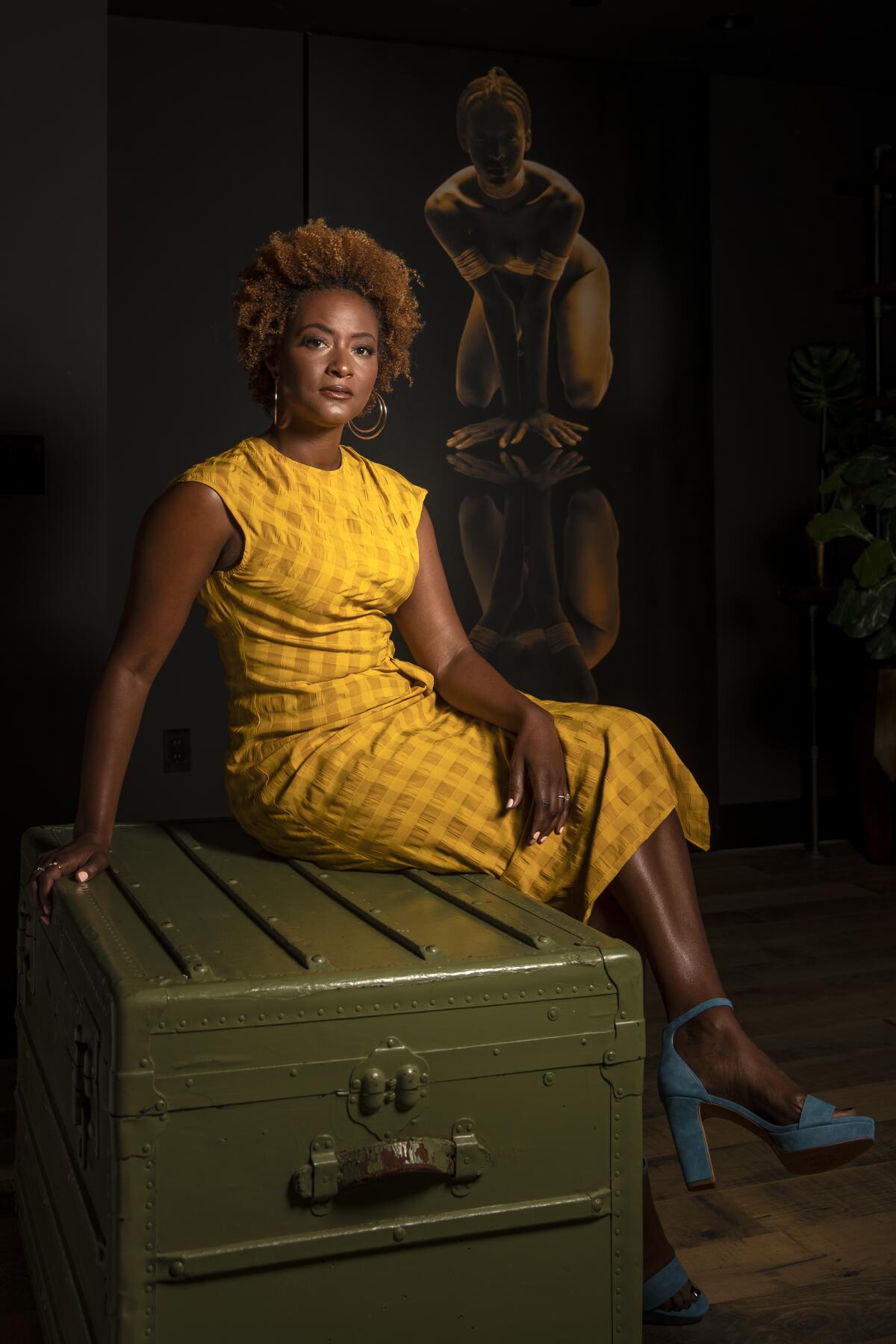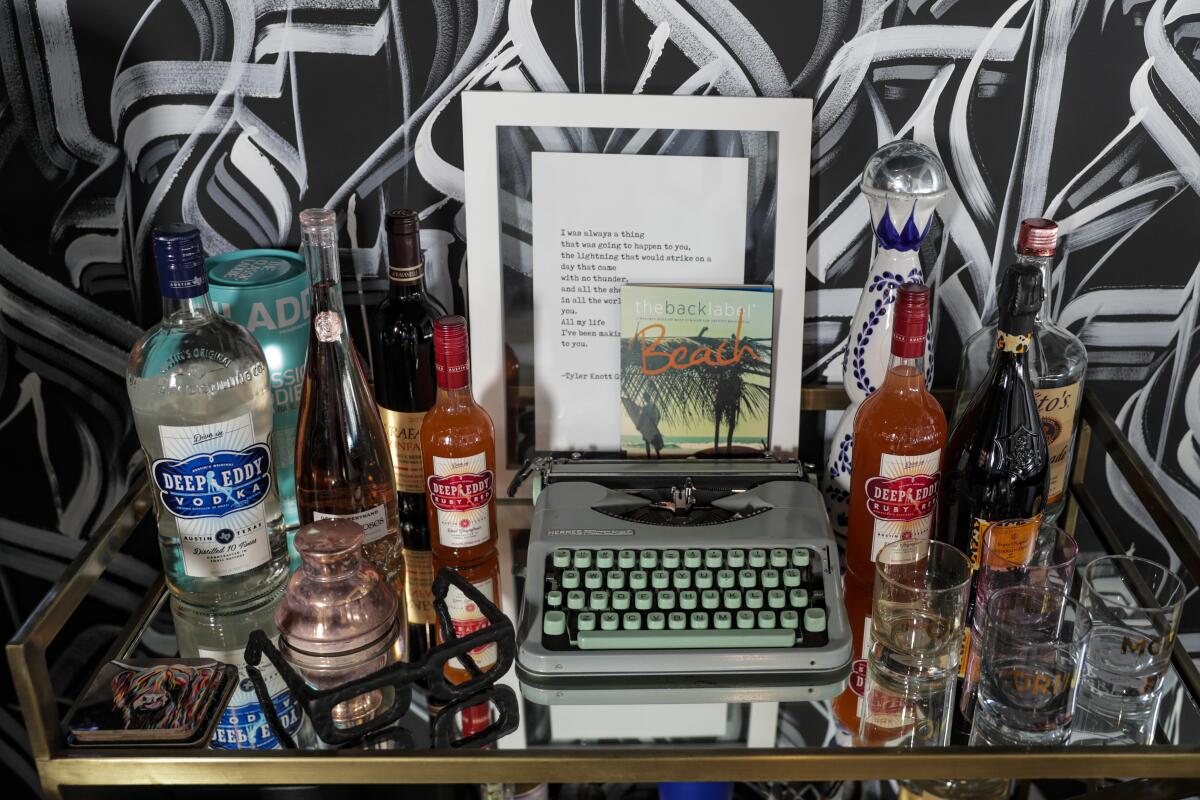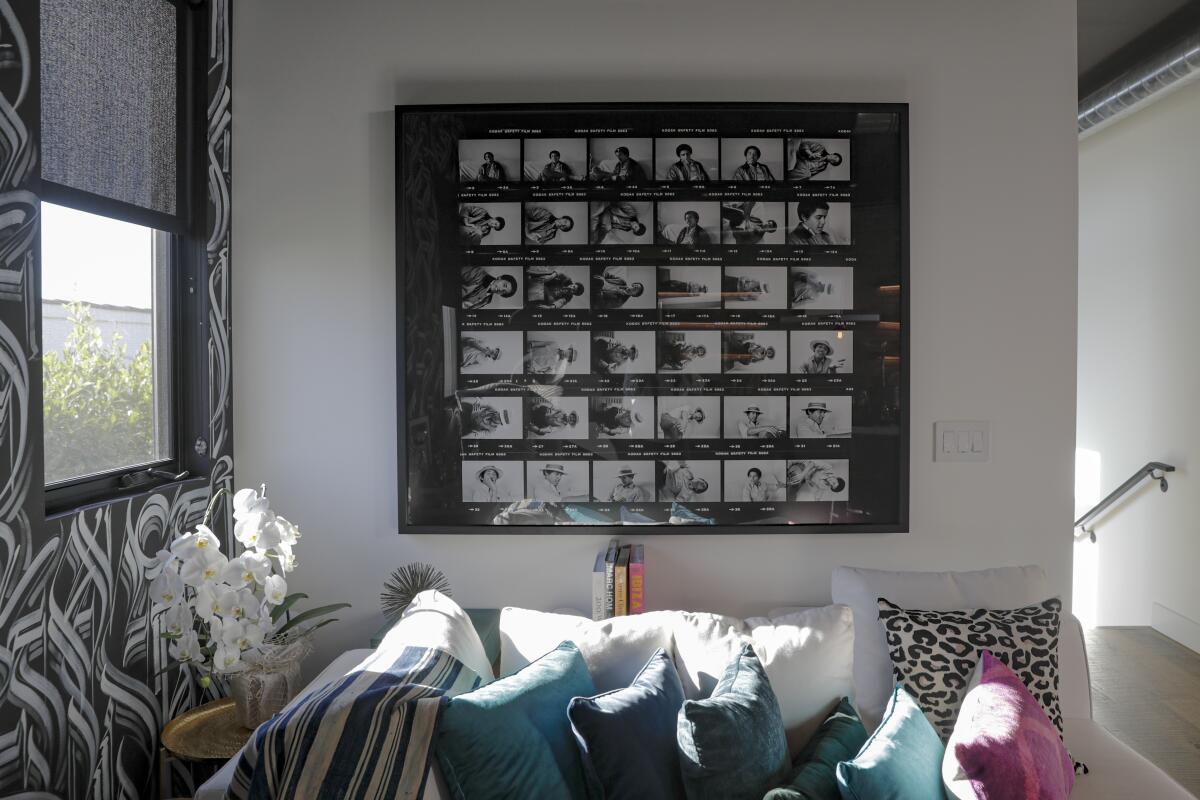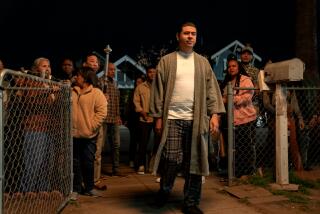‘Mixed-ish’ showrunner explains how Hollywood (still) makes inclusion hard to achieve

“Mixed-ish,” which premiered this fall, is the second series spun off from ABC’s popular sitcom “black-ish” — joining Freeform’s coming-of-age comedy “grown-ish.” And if “Mixed-ish” showrunner Karin Gist has her way, the show will provoke conversation.
The ’80s-set prequel follows a teenage Rainbow Johnson — the character popularized by Tracee Ellis Ross in “black-ish,” played here by Arica Himmel — and the experiences of her mixed-race family when they transition from a commune to mainstream living. The show, like its predecessor, has delved into some complex material involving racial identity — the handling of which has garnered both praise and criticism.
“We are very, very clear that there is no version of making everyone happy, nor is that our intent,” Gist said on a recent afternoon. “We just want to make it feel right and honest for the show, and for our characters, and reflect the world as best we can.”
The freshman comedy, which was recently granted a full-season order, is the second series Gist has guided as showrunner. She previously headed Fox’s short-lived girl-group melodrama “Star.” Gist, a former family law attorney, shoved her foot in the Hollywood door after attending a taping of UPN’s “Girlfriends.” She had been developing her writing, even enrolling in a boot camp at Santa Monica’s Bergamot Station Arts Center. While leaving the taping, Gist introduced herself to one of the writers on the show, Bernadette Luckett, with the help of the audience warm-up comedian.
“[Bernadette] talked to me and gave me a list of books to read and gave me her number and tore it off that night’s script that she had in her hand,” Gist recalled. “I took it and put it in my Rolodex back at the law firm, and then I started writing.”
Gist wrote a “Will & Grace” spec script, and after Gist revised it with notes from Luckett, the script made its way to “Girlfriends” showrunner Mara Brock Akil. Gist was eventually hired in Season 2 and would go on to work on such shows as “One Tree Hill,” “House of Lies” and “Grey’s Anatomy.”
Sitting on the terrace of her Los Feliz home, Gist talked about tackling race and identity on a broadcast comedy, creating opportunities for others and where things stand with the “Sister Act 3” script she has in development with Disney+. These are edited excerpts from the conversation.
‘There is a trust level because of what “black-ish” did’
We are trying to have a show about identity and inclusion. It’s about Rainbow and her African American mother and white father, so there’s conversations about race around that. But at the end of the day, we want everyone to watch it who feels othered or marginalized and see a little girl struggling to find her voice and find her space and step out on faith, because I think that’s a universal story.
The goal is to have people come to the show and watch the stories and see themselves in that. The goal of the show is to be a place for everybody to connect.
People really responded to the hair episode and the “What is blackness?” episode, which came right after it. We got a lot of responses from our Halloween episode, where we were talking about tokenism. And even the Christmas episode we’ll get to talk a little bit about spirituality and religion. What you believe and how you believe, and how you deal with family and holidays. We’re really talking about some things that our audiences might not see on TV all the time.
I think there is a trust level [with the network] because of what “black-ish” did. That it kind of trail-blazed a way. We’re also still under the “-ish” brand, so we have that protective cover, so to speak. When we push the envelope or have conversations about things that may be a little scary, it’s like, “Well, Mom did it,” you know? “They did it over there.”

‘That was a time when “black TV” was popping’
That was a time when “black TV” was on and popping, but that wasn’t the first time. It had been like that a few years before and a few years before that. At that time, it felt very much like just a lot of us working and telling stories that were true to the experience. That was really important on “Girlfriends” — to make it about what would really happen with these women and really build on that friendship. I didn’t know what the TV business was like. I was sort of wondering, “Is it always going to be this way?” It seemed kind of a utopia. After that, the writers strike happened, and then comedy was dead — or so they said — and everybody moved on to drama.
What I learned personally from that show is just etiquette in the writers room. How important it is to collaborate on the show. There was a core of us who stayed on for pretty much the entire run of the show. We built that show. Mara had a really great vision for the show, but we all came together to put the voice of that show on the page. Even now, I can watch an episode of “Girlfriends” and remember who pitched a joke or where it came from.
I treated that job as school. It really was my high school and college of TV. I studied everything. I studied people. I studied the way Mara ran the show, what I would do the same or do differently, the way people interacted, the way you speak to actors, how to do a rewrite, how to break down a story. I studied everything. That’s probably why it’s still really dear to me.
‘It was like “Dreamgirls”’
I want to be able to have the stuff that I work on or write be a part of the conversation. I think it’s important to have people walk away from something and think about the world, or at least I hope to have challenged the way they think or have a conversation with somebody else about it. That’s what was so amazing about “Star” for me, because it had the elements of these amazing women searching for their dream. That’s the kind of stuff I like, anyway. It was like “Dreamgirls.” I love “Dreamgirls” so much. I watch it every Christmas. So “Star” had all of that stuff, but then it had the ability to say something and challenge things and not be preachy about it and just put a lens on another experience. That is really important, I think. For people now to turn on the TV and see not just their color, but their experience, on TV.
That’s what I love about “Mixed-ish.” To some degree, that’s what was so great about “Grey’s.” “Grey’s” was one of those shows where it was the first to put [on] a lot of people of color and reflect the world. But then, as the show grew, it also became about, “What is the real experience of that person in that body?” And that’s what I think I try to find, because I can understand that.

‘I have been blessed. But I don’t want it to feel like a blessing’
My first year on “Star,” I was looking to bring up women. I felt like, “I have a seat at the table, I can bring people along.” One of the writers that I really fought for was a [production assistant] on “House of Lies,” and there was a little pushback and I said, “No, I wanted to bring her in.” Having a diverse room is really important ... especially on shows where the goal is to challenge or have a conversation about social things, then you need lots of different points of view. So I think it’s important, not just in the room, but on the crew, and to pull people up and make sure that there are people behind me.
It is hard. There’s not a lot of outward resistance, but there are things that are hurdles. Experience, for example — if you’re trying to pull someone up but nobody has given them a chance. And then it’s like, “Of course, we’d be open to a different type of person,” but then nobody has the experience. It’s an ongoing chain of not being able to give somebody an opportunity. So there isn’t the resistance of, “Don’t do it,” but there’s that system that’s already in place.
That is what I find most frustrating about the industry — the inclusion hurdles. Because, other than that, I have been blessed. But I don’t want it to feel like a blessing. I want it to be that people who have something to say and talent are given opportunity to share it. The more we can kind of open doors that way, that would go a long way.
‘“Sister Act” holds a special place in people’s hearts’
Regina Hicks [a co-executive producer on “Insecure”] and I have turned in a rewrite [on the “Sister Act 3” script] and I feel really good about it. It’s such a great franchise, and again, it’s about a woman discovering herself. So the idea of revisiting that character, who is obviously an older person now, and what’s really happening for her, and you know, like an older singer in Vegas, and what does that really look like? Especially if there are these younger singers coming up. So it’s a really relatable story — people stepping into their own and finding their voice. No matter who you are and what you do, you’re always trying to step out and say, “This is who I am.”
And, look, Disney knows storytelling. So they’ve really come from a place of how can we tell the best story with this property? Because they really respect their property. So it’s been great working with Disney, especially for me. My favorite was “Sister Act 2.” Every time I mention I’m working on a third installment, people want to talk about why “Sister Act” holds a special place in people’s hearts.
More to Read
The complete guide to home viewing
Get Screen Gab for everything about the TV shows and streaming movies everyone’s talking about.
You may occasionally receive promotional content from the Los Angeles Times.







